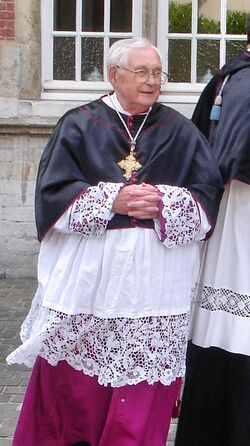Religion:Honorary Prelate
An Honorary Prelate of His Holiness is a priest to whom the Pope has granted this title. They are addressed as Monsignor and have certain privileges as regards ecclesiastical dress.[1][2]
History
Before the motu proprio Pontificalis Domus of 28 March 1968, Honorary Prelates were called Domestic Prelates (in Latin, Antistites Urbani), a title that then also went with certain offices such as that of Archbishop or Bishop Assistant at the Throne or membership of the Roman Prelature, and that was also maintained by Archbishops, Bishops and Apostolic Protonotaries who had been awarded it before their appointment to those positions.[3]
Today, as well as those to whom the award is granted individually, generally at the request of their bishops, the following are ex officio Honorary Prelates:
- The members of the Colleges of the Roman Prelatures: Protonotaries de numero; judges of the Rota; clerics of the Apostolic Camera;
- The Judges of the Rota of the Apostolic Nunciature to Spain ;
- Some or all of the members of eight cathedral or collegial chapters in Italy and one in Poland .[3]
Reforms
With the reforms of Pontificalis Domus, Honorary Prelates were made the second of three ranks of Monsignors. However, Pope Francis, in 2014, decreed[4] that (allegedly to cut down on clerical "careerism") there would be only one class of Monsignor, the lowest, Chaplain of His Holiness (formerly called Papal Chamberlain, and the category right below Honorary Prelate), and that it would be awarded only to those diocesan priests who were at least 65 years old (these changes did not affect those priests serving in the Roman Curia; religious order priests can be named Bishops but are not given largely honorary titles such as Monsignor). The higher two categories would be abolished for diocesan priests, but the change is not retroactive—those who have the three grades can still keep them (but they will not be raised to a higher grade).
See also
References
- ↑ Instruction on the Dress, Titles and Coat-of-Arms of Cardinals, Bishops and Lesser Prelates (31 March 1969), English translation published by the Vatican.
- ↑ "catholicsites.org". catholicsites.org. http://catholicsites.org/clericaldress/utsivesollicite.html.
- ↑ Jump up to: 3.0 3.1 Annuario Pontificio 2012, p. 1853
- ↑ "Pope abolishes honorary title of monsignor for diocesan priests under the age of 65". lastampa.it. http://vaticaninsider.lastampa.it/en/the-vatican/detail/articolo/31027/.



